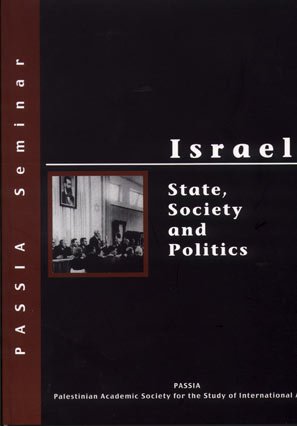Israel – State, Society and Politics
This PASSIA seminar introduced Israel - the state, the society, and its politics, imparting a basic grounding in the concepts, processes and terminology of policy-making in Israel, an in¬troduction to Israel’s history, society, and political system; an understanding and analysis of Israel’s position in international relations; and an examination of the actual policy posi¬tions of Israel toward the Middle East region, the peace process, and the Palestinians. The report contains the presentation of the mainly Israeli lecturers as well as background information about Israel and the seminar.
Overview
Dr. Mahdi Abdul Hadi
Developments in the global arena, the Arab-Israeli conflict and the peace process since the early 1990s have brought the Palestinians and others in the Middle East a new status in international relations. In many respects the Palestinian entity must perform like a state, even though it has yet to attain formal statehood. The pool of Palestinian professionals, experts and practitioners with a working knowledge of the political system, regional policies and external relations with other states is as yet relatively limited, and there is a clear need to increase and develop it.
Against this background PASSIA initiated in 1992 its Education and Training in International Affairs program, which has since served as a pioneer in providing educational seminars for Palestinian graduates and professionals. The seminars are conducted by Palestinian and foreign experts of the highest level and aim at enabling the participants to establish and deepen their knowledge and expertise in the field of international affairs, foreign policy and diplomacy, as well as with regard to country-specific studies. Subjects dealt with thus far include Strategic Studies and Security, The European Union, Diplomacy and Protocol, The Foreign Policies of Arab States, Diplomacy and Conflict Resolution in the Middle East, and The US and Canada, and Japan and the Middle East.
To date, some 150 Palestinians have participated in PASSIA seminars, adding to the goal of establishing a pool of Palestinians with a specialized working knowledge in foreign countries.
In 1999, having conducted seminars on many other countries around the globe and realizing that Palestinians’ knowledge of an entity in its immediate proximity is very limited, we at PASSIA decided that it is time to take on the challenge and responsibility to introduce Israel – the state, the society, and its politics. The large number of applicants PASSIA received for this seminar only confirmed the high demand among Palestinians to gain a better understanding of the components and workings of Israel’s internal system as well as of its political culture and historical perceptions.
As previously Americans and Canadians where invited to lecture on the US and Canada and Europeans to present their countries’ policies and systems, PASSIA approached a number of Israelis from various backgrounds - ranging from academia, to media to politics and religion - to address the seminar participants and impart their understanding of Israel. It should be noted here that in approaching the potential lecturers - mainly the “mainstream” to ensure the fairest and most objective presentations possible - we did not receive a single negative answer. On the contrary, there was encouragement, support, a bit of surprise, but certainly recognition of the challenge.
We at PASSIA have always believed that no matter what one’s attitude is - anti-Zionist, anti-Israel, anti- or pro-peace etc. - anyone can and should learn about the Israelis.
A final note on the participants: in order to make the most out of PASSIA seminars, we always ask that every participant take off his/her political shirt so as to just be a Palestinian who listens carefully and with confidence, provokes, asks, and disagrees where the need is felt, since the ultimate idea is to understand, learn, and maybe become one day an expert on the issues at hand.
The following report contains the proceedings of the PASSIA seminar, including presentations given by the lecturers and summaries of the subsequent discussions, where appropriate. In the appendices, one can find information about the lecture program, the Palestinian participants, and a section on “Israel at a Glance”.
On the behalf of PASSIA I would also like to take this opportunity to express our appreciation to the Ford Foundation, whose kind support - through the Association of Palestinian Policy Research Institutions (APPRI) in Ramallah - made this seminar program possible. Our thanks go also to the lecturers, who contributed greatly to the success of the seminar.
Introduction
Dr. Mahdi Abdul Hadi
Origins of Political Concepts and the Zionist Movement (Pre-1948 History)
Prof. Shlomo Avineri
Jews and Arabs under the British Mandate
Tom Segev
The Creation of Israel, the War of 1948 and Early Institution-Building
Prof. Moshe Lissak
The Political System in Israel: Government, Knesset and Lawmaking
Naomi Chazan
Social Cleavages and Political Parties
Dr. Benyamin Neuberger
Economic Growth in Israel, 1948-2000
Dr. Paul Rivlin
The Military and Security Establishment (IDF, Intelligence branches, etc.)
Dr. Yoram Peri
The Histradut: Continuity and Change
Dr. Uri Davis
Israeli Society and Religion: Ethnic Groups, Identity and Nationalism
Rabbi David Rosen
Israel and the Mediterranean Option
Dr. David Ohana
Palestinians in Israel: Integration, Autonomy or Secession
Dr. Said Zeedani
The Israeli Lobby and US-Israeli Relations
Colette Avital
Israel’s International Relations: The US, Europe and International Organizations
Dr. Shlomo Aronson
Israeli Politics: From the Intifada to the Peace Process
Dr. Asher Susser
Israel and the Middle East Peace Process
Dr. Moshe Maoz
Israel’s Future in the Region: Conflict or Cooperation?
David Kimche
Appendices
Appendix A: Israel at a Glance
Appendix B: Lecture Program and Palestinian Participants

